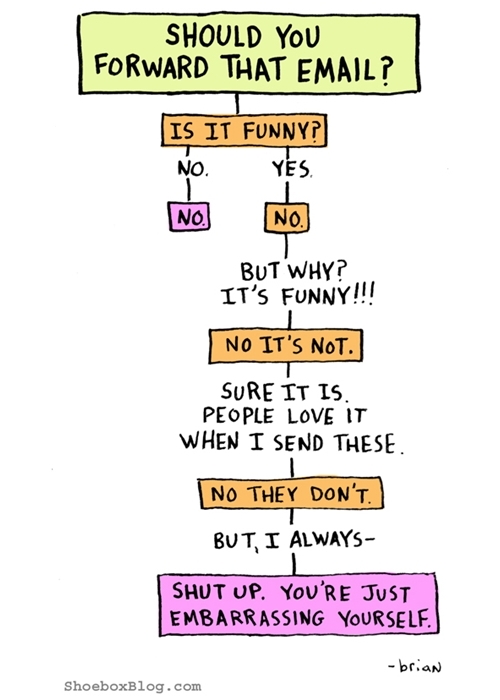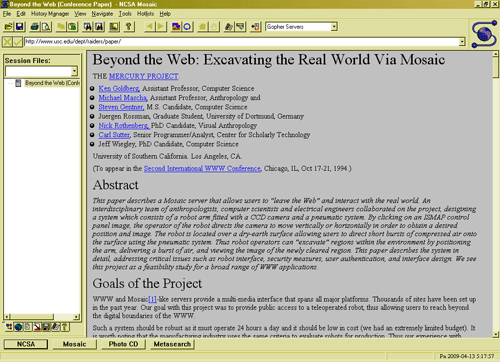Category Archives: Internet
“The machine we’ve made”
“I think we should prepare ourselves for all kinds of new religions based around the idea of a planetary soul. As in a single web of electronic neurons around the globe, connecting all sentient beings. The Noosphere will go from a hypothetical speculation by a Catholic priest to an outright competitor to the Catholic faith. We will see the rise of Noosnics, Globalists, Overminders, Bit Monks, Quantumarians, and a hundred other sects and cults that take seriously the idea of a glorified planetary spirit as a reflection of the divine.”
“The internet will become a religion in part because everything will happen on it, including all other religions. But mostly because it will be the first platform for true Otherness that will appear on the planet. Not Other as in other variety of human, or other variety of animal, but Other as in an agent not like us, yet bigger than us. A true alien being. Of which we are part. This conundrum will trigger so many spiritual and religious buttons that it will also shake the established religions.”
Learfield videographers
When I started messing around with putting video online, I was one of the few in our company doing so. Oh, there were lots of folks who knew more about video than I, but the crude tools and results in those days wasn’t worth the effort to most folks. Today, we have lots of talented young men and women doing video. I’m discovering more every day.
Here’s a nice one by Allison Blood, one of the new reporters in or Missourinet newsroom.
Slightly revised Gadekunst from Allison Blood on Vimeo.
It would be a sad thing if, after 15+ years of Internet, I was the go-to guy for putting a video clip on line. Which was the case for a while. But no more. I think I’ll use this post to link to the work of these talented men and women.
Moving from ownership to access
“Who owns this data? Who owns your friendships? There’s another party involved. Who owns your genes? 99.9% are shared by other humans. Who owns your location? The knowledge that you’re in a public space is hard to own. Your reputation or history? Your conversations? The real issue is that we’re moving away from ownership altogether to access. The benefits of accessing are eclipsing the benefits of (owning) it – consumers may eventually not own anything at all. Netflix means you can stop owning movies – if you have access to all movies anytime, why would you buy movies? This may be leaking from the virtual to the material world, particularly once we have personal fabrication. It may eventually play out into data, because access is often better than ownership.”
From Kevin Kelly’s remarks at the Quantified Self conference in May this year. More of Kelley’s speech.
Should you forward that email?
“Bottom-Up Revolution”
From an opinion piece on Al-Jazeera, by Paul Rosenberg
Obama, however, is just one political figure, reflecting the more general state of US politics – particularly elite opinion and major economic interests. His ambivalence is, in this sense, an expression of America’s fading power. Obama’s belated attempts to play catch-up with the Arab Spring are but one facet of a more general loss of previous dominance.
And this from Wadah Khanfar, on the obsolecense aging Arab regimes:
This outstanding change, this historic moment, was totally lost on ageing governments that thought they were dealing with a bunch of kids who only needed to vent and then go home to their aimless lives. But they were wrong: because their ideas were old, their opinions were old, their minds were old, and their spirit was old. Ignorance can sometimes be a tool of destiny.
I’m finding Al-Jazeera a very credible and refreshing source for world news.
And then there’s this from a recent NYT story:
The Obama administration is leading a global effort to deploy “shadow” Internet and mobile phone systems that dissidents can use to undermine repressive governments that seek to silence them by censoring or shutting down telecommunications networks.
The effort includes secretive projects to create independent cellphone networks inside foreign countries, as well as one operation out of a spy novel in a fifth-floor shop on L Street in Washington, where a group of young entrepreneurs who look as if they could be in a garage band are fitting deceptively innocent-looking hardware into a prototype “Internet in a suitcase.”
Reminds me of all those Stinger missles we gave the Taliban fighters to use against the Russkies.
If you want my attention, you must earn it
 My pal Todd sent me an email yesterday with a link to a YouTube video. I asked why he didn’t just direct message me on Twitter or Google Chat.
My pal Todd sent me an email yesterday with a link to a YouTube video. I asked why he didn’t just direct message me on Twitter or Google Chat.
“Email is easier for me,” was his reply. He was sharing something he thought was interesting so he gets to decide what works best for him. Right?
A lot of people screen their in-coming phone calls. This infuriates some callers who feel you have an obligation to take their call.
All of this got me thinking about who controls communications of this sort. The “sender” or the “receiver.”
Every evening our USPS mail box is filled with junk mail that we routinley throw in the dust bin (for my UK pals). I asked the mailman about this last week, if there is any easy way to stop 3rd class mail. He mumbled something about writing each of the senders. Yeah, right. In that instance, the direct mail people control the communication up to the point I shit-can the stuff.
I was intrigued by the decision of UNC professor Paul Jones to abandon email altogether:
“I spent 30 years investing in email,” Jones said. “The undergrads I teach use everything but email. Journalists use Twitter. You can use anything else to get in touch with me — text messages, AIM, G-chat, Facebook, Facebook chat … but I was investing too much into email and getting little back.”
I send a lot of email but don’t expect anyone to open and read what I send. It’s my responsibility to make the subject line so interesting and relavent to the recipient that she WANTS to read it.
This seems pretty cut-and-dried to me. You might want to communicate something to me, but you need my permission. I have to open the email (or snail mail); pick up the phone; grant your friend request.
It’s my attention. If you want some of it, you have to earn it.
When the net was young
A couple of nights ago I was browsing through some old Day-Timers (calendars) and came across a few memories from 1994:
April 26 – A meeting with some folks at MOREnet and the University of Missouri J-School. My first look at a web browser (Mosaic). I was blown away. The Internet was a very different creature before the browser.
June 20 – Sent check to someone named Bill Bahr a check for $1,700 for a used Toshiba notebook computer. Base price was $1,400 plus $300 for a fax/modem PCMCIA card.
I think it was this one. It was a heavy mother but I was giddy at the idea of being able to take a computer with me on the road.
Is Gen Y changing the workplace?
Generation Y (GenY) is made up of those born between 1981-1999. I hear a few knocks on today’s young people but mostly from older folks with a very different view of… everything. I found the following in a story on a Canadian website and have applied for membership in Gen Y.
Clay Collins, author of The Alternative Productivity Manifesto and Quitting Things and Flakiness: The #1 Productivity Anti-Hack, argues that Gen Y is different than previous generation workers in the following ways:
- Gen Y uses modern tools and technologies, including software that’s easily accessible and free from the Internet;
- Gen Y easily maintains their to-do lists, and priorities by synching with the PDAs and iPODs;
- Gen Y are not workaholics, and understand the relationship between a balanced life and productivity;
- Gen Y are more likely to love their jobs, because they change jobs more frequently, and stay in jobs that match their passions and talents;
- Gen Y has a continuing thirst for learning and personal growth;
- Gen Y wants to have new experiences, try new things, and be creative;
- Gen Y doesn’t stay in jobs they don’t like just to be comfortable and secure.
Understanding Generation Y is important not just for employers. Older workers–that is, anyone over 30–need to know how to adapt to the values and demands of their newest colleagues. Before too long, they’ll be the bosses. via Is Gen Y changing the workplace? Entrepreneur Financial Post.



